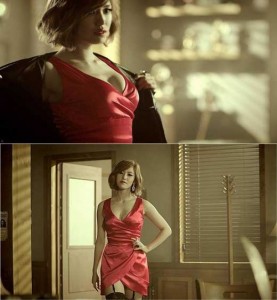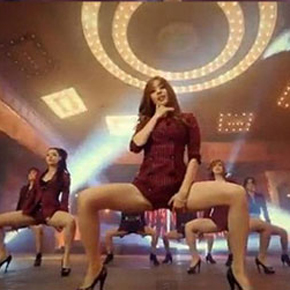 As should come as a surprise to approximately no one (and certainly not to me, since I complained about it just last week), the ladies of Secret seem to have run into a bit of trouble with their newest single “Poison”‘s provocative choreography. Apparently the repeated hip thrusts and chest bumps weren’t exactly putting them in good graces with the (non-adolescent male) viewing audience, and it looks as though the girls may have to modify the song’s dance to include…fewer hip thrusts and chest bumps, I suppose. Of the potential changes, TS Entertainment had this to say:
As should come as a surprise to approximately no one (and certainly not to me, since I complained about it just last week), the ladies of Secret seem to have run into a bit of trouble with their newest single “Poison”‘s provocative choreography. Apparently the repeated hip thrusts and chest bumps weren’t exactly putting them in good graces with the (non-adolescent male) viewing audience, and it looks as though the girls may have to modify the song’s dance to include…fewer hip thrusts and chest bumps, I suppose. Of the potential changes, TS Entertainment had this to say:
We could never have predicted that the choreography would be controversial. We’ll monitor the response this week and then decide whether or not we should change the choreography.
Really? Really, TS Entertainment? You had no idea that a video that featured a more intimate look at Sunhwa‘s intimates than I’d ever care to see would have some sort of repercussion for you? How interesting. And really, isn’t it interesting that pretty much whenever a girl group comes under fire for employing some very sexy choreography, the company in question always releases some variation of the above statement?
It has been pretty evident for some time now (as was originally pointed out over at The Grand Narrative) that this sort of choreography debacle is becoming a trend with girl groups. A song is released that in some way pushes the envelope just a little too far; viewers and/or broadcasting companies whine about how vulgar the girls look; companies feign shock and surprise that anyone could possibly have taken repeated pelvic thrusts the wrong way; the choreography is modified in an abnormally short period of time; and then the group executes the new choreography flawlessly, which is almost ironic, given how long most groups take to prepare for a comeback and how little time they had to make a serious change in the performance. It almost seems like a media ploy, as though entertainment companies are purposefully and determinedly crossing the line just to get people talking about their group — and once the fallout subsides, they produce a back-up choreography that they had originally prepared “just in case” people expressed concern over choreography that was designed to raise eyebrows in the first place.
 So TS Entertainment seems to have become the latest company to pull this sort of scheme — and it’s unsurprising. But in this case (and upon further review), I actually find far less of a problem with Secret’s original choreography than I do with the way it was presented. And I would argue that this makes all the difference.
So TS Entertainment seems to have become the latest company to pull this sort of scheme — and it’s unsurprising. But in this case (and upon further review), I actually find far less of a problem with Secret’s original choreography than I do with the way it was presented. And I would argue that this makes all the difference.
Is it true that “Poison” features a couple of dance moves that mothers probably wouldn’t want their young daughters imitating? Probably — but the song is aggressive, sexual, and fierce, and Secret are not little girls anymore. Actually, given the saccharine disasters that were “Shy Boy” and “Starlight, Moonlight,” it is almost refreshing to see Secret step back into more familiar territory and own their sexuality and femininity; if there’s one thing worse than being excessively provocative, it’s acting like a infantilized little girl with sex appeal. However, what could have — and probably should have — been a stronger expression of female sexuality in a K-pop song very quickly turned into something cheap and vaguely pornographic. More so than we should cast blame on Secret’s choreography (and their execution of it) should we point fingers at the folks behind the cameras, who turned the choreography into a show explicitly designed to delight male audiences.
Consider both the music video and Secret’s first performance on M! Countdown. So much of the former was shot from an angle that I often refer to as the “soft core porn” angle, and it was most definitely deliberately done. By shooting the girls from an upward-looking angle, all dance moves that in some way emphasized the lower region of the body — the spread-leg squat moves, for example — become infinitely more provocative and suggestive. The exact same camera trick was used to film both SNSD‘s “Genie” as well as Hyuna‘s “Bubble Pop,” and while it is difficult to deny that Hyuna’s original choreography isn’t oozing sex appeal to begin with, the choreography coupled with the aforementioned camera angles creates an effect that really shouldn’t sit well with audiences who don’t watch K-pop with the intention of  watching something so eroticized. While Secret’s choreography isn’t exactly pretending to be innocent, the upward angle just takes to a whole new level of wrong.
watching something so eroticized. While Secret’s choreography isn’t exactly pretending to be innocent, the upward angle just takes to a whole new level of wrong.
Beyond the music video, the camera angles used during Secret’s performance were almost worse. Rather than filming from the upward angle, whoever was working the cameras made no secret of their attempt to focus their attention solely on the provocative nature of the dance moves. Whenever the choreography hit a sexy dance move, the camera’s focus immediately left the girls’ faces and focused only on the pelvic region. What is this supposed to tell us about how we as viewers are supposed to view and understand the performance? Are we supposed to somehow get the impression that the girls aren’t be objectified purely for the delight of male fans? How are women to understand ownership of their own sexuality if ownership is so clearly being wrested from them and placed in the hands of men who are more than happy to train the camera on breasts and asses?
I’ll admit, I was terribly disappointed by how cheap Secret’s music video came across, and that feeling of disappointment led me to a sense of dissatisfaction with the choreography and with the way it was presented. However, in light of the recent controversy surrounding their live performances, I think it is fair to say that the choreography itself might not be the problem. Secret’s current dilemma sheds light on an industry-wide problem. K-entertainment has yet to figure out a way to allow female performers to own their expressions of female sexuality and empowerment without turning it into a sleazy spectacle that appeals only to male audience members. Granted, the lack of perceived autonomy in governing one’s own sexuality in the K-pop industry is questionable, largely because I suspect that so much of what appears to be sexually suggestive is the brainchild of men who use their power in crafting girl groups to fulfill their own fantasies. But Secret are no strangers to powerful choreography backed by strong music, and it is unfortunate that what could have been empowering and badass became cheap and tawdry, all because cameramen couldn’t keep the lens off of their crotches.

